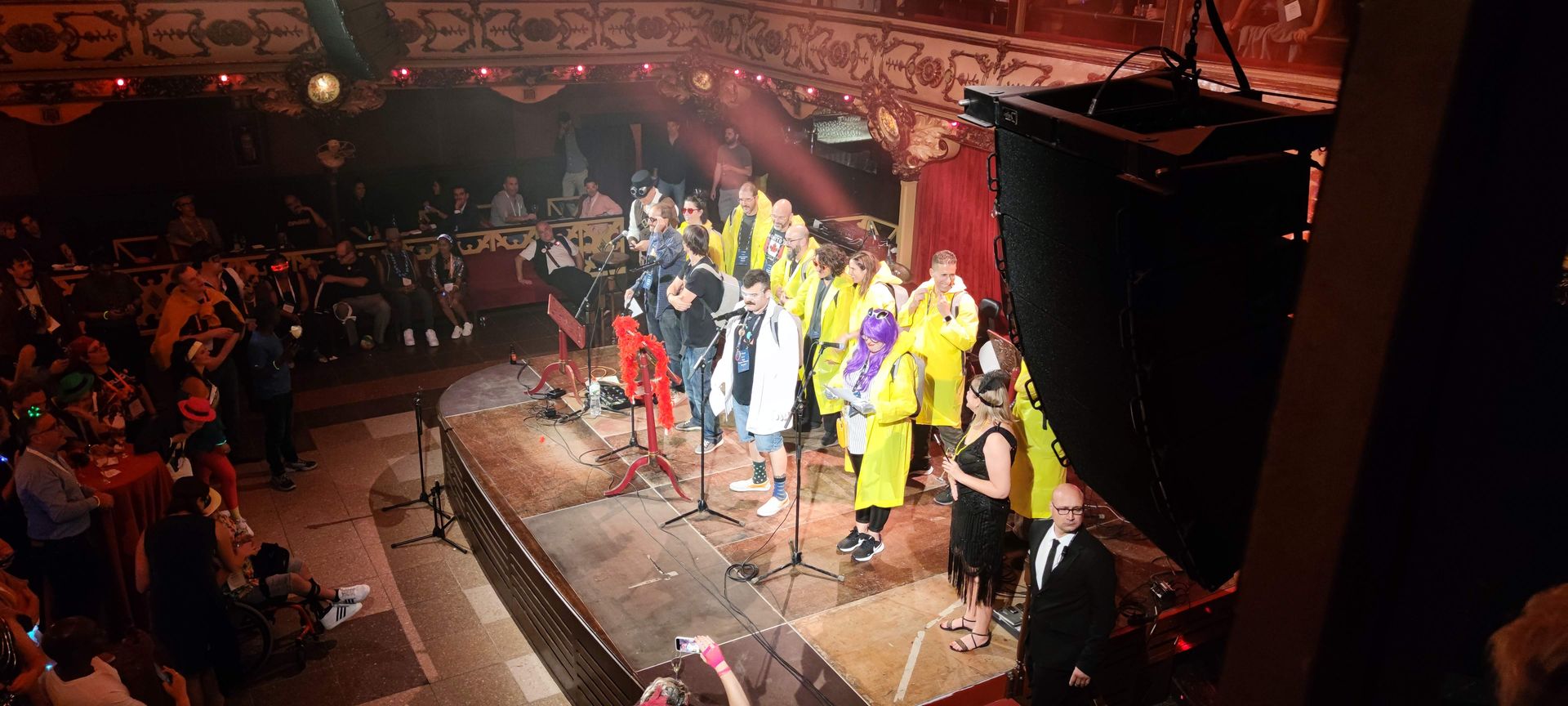With the first day behind us, the 2nd day of the Global Moot, started with an inspirational talk from Mrs. Andreia Inamorato. Although everything mentioned in the talk was very interesting, we will keep as a personal highlight, the reference and discussion on the Digital Competences for Educators, work that has influenced the Moodle Educator Certificate offering, and our work as EdTech experts.
After the keynote, we dove into the parallel sessions again, where we had the chance to follow some really interesting presentations. The accordion below, highlights some of them.
In this session, which was dedicated to Moodle Workplace, we had the opportunity to listen to Emilio Lozano and Marina Glancy present Moodle Workplace 4.0 and discuss its new and exciting features. The session ended with a talk from Maritxell Reves about using competencies with Moodle Workplace, which was also very interesting for us, as we work a lot with competency frameworks and learning plans in both Moodle LMS and Moodle Workplace.
If you are interested in corporate learning, or already using Moodle Workplace and you would like to reap the value of using competences and dynamic rules to streamline your learning processes, use our contact form to reach out to us.
In parallel to the Moodle Workplace session we also attended the session dedicated to unique cases of using Moodle, in various contexts. For the first talk of the session, Mr. John Azinheira talked about how you can scale Moodle LMS to serve 1,000,000 learners. John talked about the technical challenges and the pitfalls and answered questions from many participants during the session and after it.
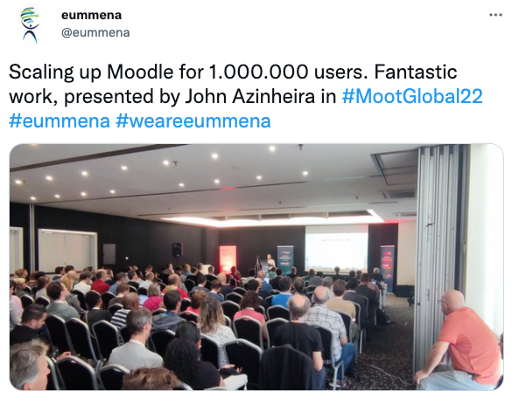
In this session, we also attended the talk from Mr. Andrei Ternauciuc, from Romania, who used Open Badges, to foster the creation of a Digital Education Community, in the Polytechnic University of Timosoara. PUT, uses a Moodle LMS with 503 (!) plugins, and wanted to increase the participation of the teachers in putting their content online. The biggest challenge for achieving this, is (as in most cases) the fact that the content was available in formats that were not very interactive, engaging of even easy to use. Despite the initial resistance, through the application of a system of badges that also acted as an incentive for the teachers, PUT managed to get 100,000 activities created in just one year.
In this session, we had a special interest for one of the talks. It was a real pleasure to listen to Mrs. Claudia Delgado, describing the amazing work that IODE UNESCO is doing and how Moodle is supporting this.
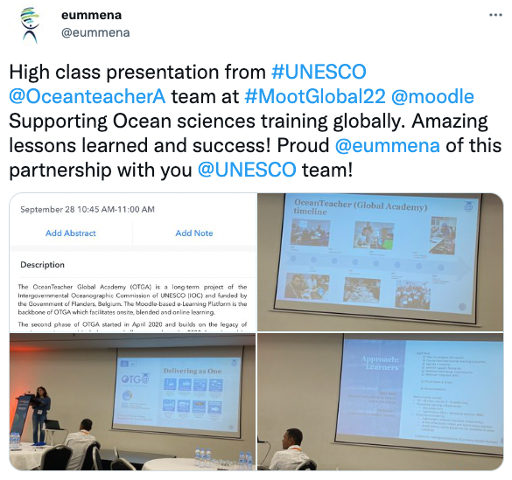
OceanTeacher Global Academy has been offering training on Oceanic Sciences and they have also created their own course on Moodle LMS in order to train their course creators on using the platform. Eummena has been supporting this project since 2020 and we have also helped in the redesign of the platform to better serve the needs of IODE UNESCO.
Another talk that lies close to our heart, in this session, came from Mr. Mark Berthelemi from Centre for Agriculture and Bioscience International (CABI) who described how they're using Moodle to serve agricultural communities. Eummena has been involved in the past, in European projects, funded under the Erasmus+ programme, where we supported the training of various agricultural actors, through our own, custom Moodle for agriculture.
In the first talk of this session, we had the pleasure of listening to Mrs. Lauren Goodman and Mrs. Michelle Moore, describe to us, how Moodle US supported UNESCO Institute for Lifelong Learning to build courses for their educators.
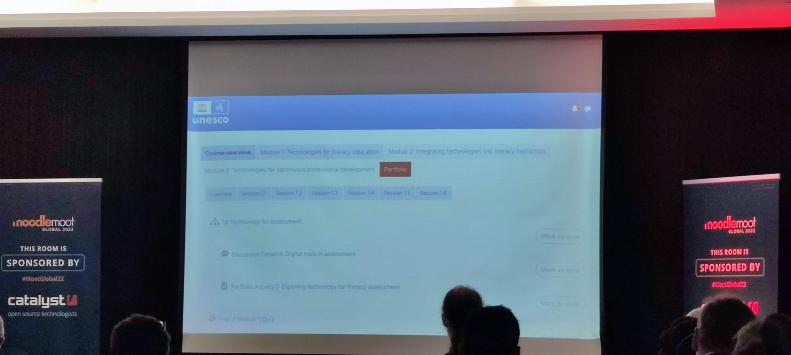
In this case, OneTopic was used, together with Discussion forums, portfolio activities and quizzes. For us, this case served as the perfect example of how "less is more". Having a clear view of what you aim to achieve, and stripping this down to bare essentials, is what Moodle US and UNESCO did in this case. In the end, everything worked great, even for material that needed to be delivered offline, as the courses were built in such a way that someone could just as easily print them, losing none of the course content. A clean and simple structure, together with some font-awesome icons, went a long way for UNESCO.
In this session, we listened to Bjørn Torleif Lia, describe a Moodle Workplace project, where the platform supported 58 companies to bring 13,000 people back to the workforce.
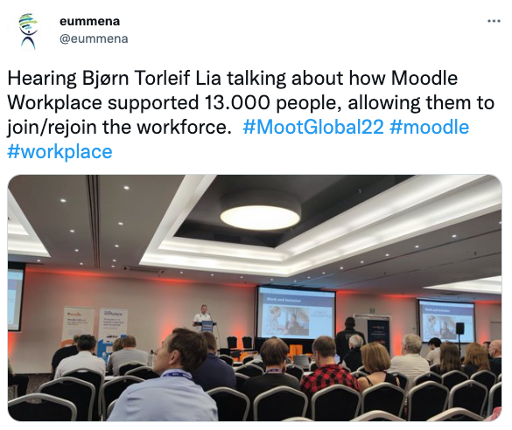
In this case, Moodle Workplace, was customised so that companies that offered jobs, could send an invitation to the person seeking a job through the platform. The link in the invitation allowed the person to create an account in Moodle Workplace and to receive access to the training for the specific job offer. It was really an interesting case of Moodle Workplace from a technical perspective, but most importantly for its societal impact.
In this session, we had the chance to hear from Mrs. Chrysoula Papazoglou, about the case of the largest university in Greece with 50.000 students, that discussed with us, their Moodle LMS and the existing integrations.
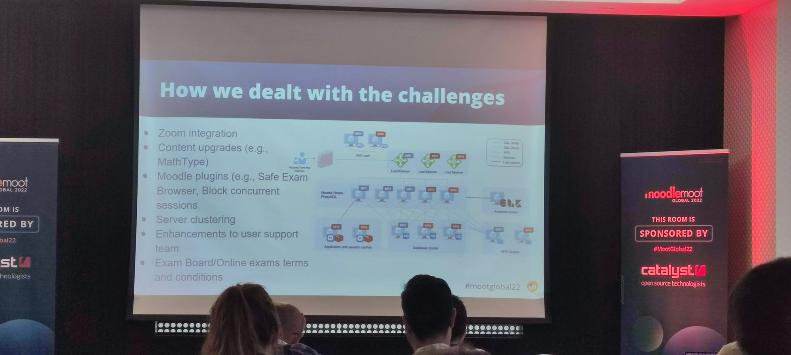
Chryssa, gave a very detailed and thorough presentation about their amazing work with Moodle that extends beyond the boundaries of a traditional LMS, into the integration with their in-house SIS. It was also very interesting to hear about the challenges they faced during the pandemic and how they managed to cope, supporting the operation of the entire university, in the process. Our main takeaway from this presentation is the fact that the use of the LMS in the university increased during the lockdown, but impressively enough, it remained high, even after the students returned for face to face lessons.
In this session, we really enjoyed the presentation from Davina Beegoo-Price and James Reed from the Online Student Experience team at The Open University (UK). Their presentation, shared key research findings that showed how changes in lifestyle may have changed study behaviours. They attempted to explore how these changes could influence app development in the future.
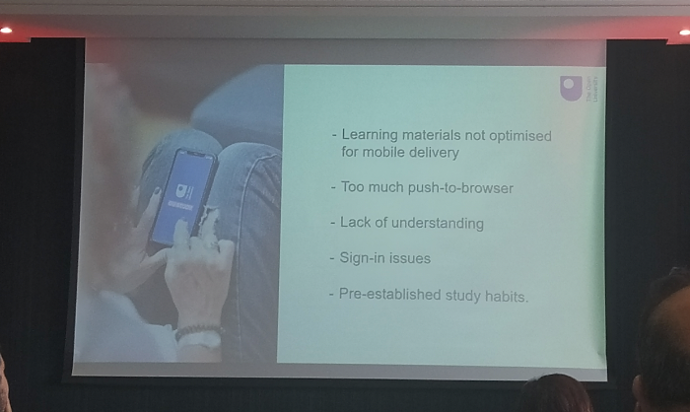
The presentation discussed issues that students are facing now, with one of the major ones being the lack of courses that are optimised for mobile delivery. Another factor that impedes the adoption of mobile learning is the pre-established study habits which are centred around devices like the laptop. The authors discussed a series of recommendations that could allow for a seamless integration of mobile devices into the learning process. Simply put, take advantage of the positive aspects of an app, as an easier way to check out your assignments, post to forums, or consult your study plan.
Although the sessions ended late in the afternoon, the day was still young. After a networking slot of 1 hour, we got back to our hotel rooms and dressed up as time travellers to match the theme of our party. We gathered in an amazing venue which we filled with Marty McFlys, Professors, Roman soldiers, Greek Gods, burlesque dancers, mobsters, and anything else you can think of. We will leave you with some photos from a night filled with laughs, dancing, as well as great food and drinks.
Next stop - Day 3: See you next year!

